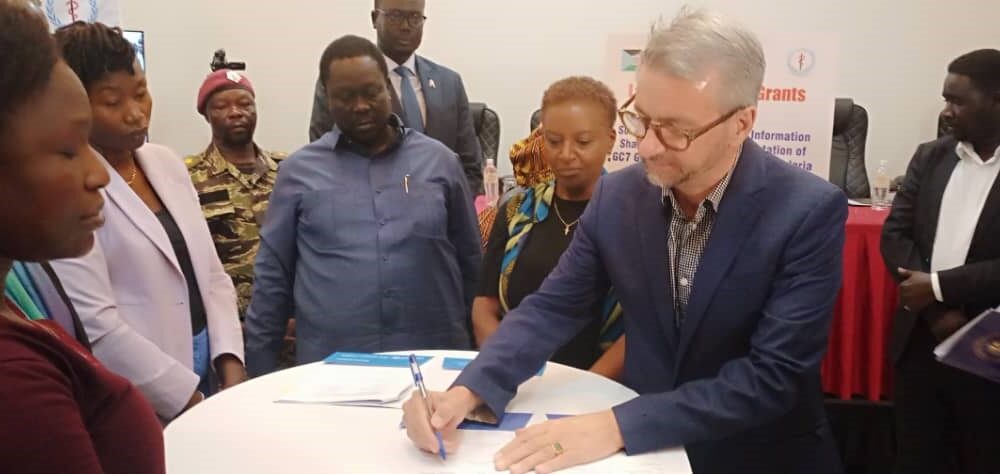By William Madouk
South Sudan has received a significant amount of US $167 million from the Global Fund to fight against three deadly illnesses, AIDS, Tuberculosis and Malaria.
The government and UN agencies have signed Seventh Grant Cycle (GC7) for a period of three years, from 2024 to 2026, in order to combat the diseases effectively.
The National Ministry of Health, the Country Coordination Mechanism (CCM), HIV and AIDS Commission, UNDP and UNICEF signed the grant.
In his speech, Vice President for Service Cluster, Hussein Abdelbagi Akol said the impact of these three diseases cannot be overstated.
He added that the diseases remain as a significant threat to the public health, mainly vulnerable communities and developing nations.
“The GC7 grant represents an opportunity to build more of our efforts and move our focus to achieve our shared goal of ending the pandemic of tuberculosis, HIV and AIDS,” said Akol.
He emphasized that the funding should cover critical initiatives such as expansion of access to living-saving, treatment and implementation of prevention strategies.
The programme aimed to reduce HIV infection by 25% and AIDS related deaths by 2026 as well as reduce HIV related discrimination and other inequality towards people living with the ailment.
In allocation breakdown, HIV response is allocated $50.2 million, Malaria with US 53.3 million and TB 17 million dollar.
It includes $23.5 million for the Resilient and Sustainable System for Health (RSSH) and COVID-19 gets $23 million respectively.
According to a joint statement, the donation is the largest Global Fund contribution since the country gained independence in 2011.
The national minister of Health, Yolanda Awel, said the diseases are devastating the greater Upper Nile and Bahr El Ghazal regions, thus attention should be focused on those areas.
“These areas were under deserved at the time of CPA, due to the planning policy put during CPA. This was because the diseases were rampant at East Africa we focus on the Southern belt and that’s why stronger mechanisms are in the Southern belt,” said Awel.
She also stressed the funding is like a drop in the ocean as much resources are needed to curb the ailments.
“If we go and do random testing of the streets and you take about five or eight of them, I assure you half of them are infected by HIV and they don’t know, and at the time that they know they don’t have facilities nearby,” added the minister.
“What I am trying to say is that more funding is needed to make sure that HIV, TB and Malaria is treated,” she continued.
For his part, Mr. Boniface Njenga, senior fund portfolio manager, at Global Fund, said the programme is imperative for everybody to get healthcare services that they deserve and to ensure no one is left behind.
In a joint statement by the government and partners the bonanza was approved on December last year.
According to South Sudan AIDs Commission’s 2020 report, the rate of HIV/AIDS infection in rural South Sudan has increased by nearly 1%.
Based on the commission, the infection rate has risen by 0.9 per cent from 2.4 to 3.3 in 2020, with the majority of cases occurring in rural areas.
The report stated that Western Equatoria and Lakes State top the list as hotspots for the infection garnering 6.4 and 5.2 respectively.
The region with the least prevalence is Upper Nile State. In the aforementioned regions, the prevalence was higher in rural areas, 4.4 per cent compared to urban areas 3 per cent.
In South Sudan, Malaria remains a severe potentially fatal disease, ranked among the top three causes of child mortality in the country with an estimated 68% OPD consultations, 30% admissions and 50% deaths.
The grant will be disbursed to the two implementing agencies; the UNDP for HIV, TB, Resilient and Sustainable System for Health (RSSH) and COVID-19 amount worth 116.3 million, meanwhile UNICEF to manage Malaria component worth 53.3 million.




